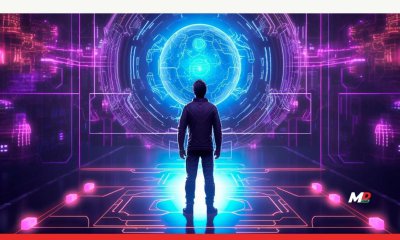Published
1 year agoon

For generations, the career arc followed a predictable pattern: education, entry-level job, steady promotions, retirement.
Today, this trajectory is increasingly rare. Job hopping has lost its stigma, the gig and freelance economy is booming, artificial intelligence is reshaping industries, and workers are demanding a better work-life balance. The traditional career path is being dismantled—but does that mean careers are dead? Far from it. It simply means we need to redefine how we work and adapt to an ever-changing landscape.
Job Hopping is the New Normal
The days of staying with one company for decades are over. A 2022 report found that 22.3% of workers aged 20 and older had been at their jobs for one year or less, and 33% had been there for less than two years. Younger workers, in particular, see frequent job changes as a way to gain skills, increase salary, and find a better cultural fit. Companies, once wary of “job hoppers,” are beginning to recognize that fresh talent and diverse experiences bring new value.
The Rise of the Gig and Freelance Economy
Freelance work now represents 36% of the American workforce and is growing faster than traditional employment. Platforms like Upwork and Fiverr enable professionals to work on their own terms, choosing projects that align with their skills and interests. Even white-collar professionals are embracing fractional work, where they lend expertise to multiple organizations instead of being tied to one employer.
Artificial Intelligence is Reshaping Jobs
AI is automating tasks once thought to be the exclusive domain of humans. A recent World Economic Forum report estimated that AI will disrupt 85 million jobs by 2025 but will also create 97 million new ones. The key question is: Will your job evolve, or will it be replaced? Reskilling and adaptability are more critical than ever.
Work-Life Balance is Now Non-Negotiable
The pandemic accelerated a shift toward remote and hybrid work, prompting workers to rethink their priorities. Burnout and dissatisfaction have fueled trends like “quiet quitting” and the “lying flat” movement, where employees do the bare minimum to maintain work-life balance. Organizations that fail to address these concerns will struggle to retain talent.
Unpredictability is the New Constant
Traditional career stability is eroding. Economic downturns, technological shifts, and corporate restructuring can upend a career overnight. In response, workers are embracing a “portfolio career” approach—diversifying income streams and continuously acquiring new skills to stay relevant.
The dismantling of the traditional career arc can feel like a crisis, but history shows us that change breeds opportunity. Just as the steam engine made horses obsolete, television overtook radio, and the internet disrupted print media, new industries and roles will emerge. The question is: Will you be ready for them?
Shift Your Mindset
In Western cultures, a “crisis” often implies disaster. And truthfully, humankind does not appreciate change. It is often seen as anathema. However, instead of thinking you’re staring down the barrel as a plethora of forces come into play, view it as a turning point for growth. Just as midlife crises have given way to midlife reinventions, career shifts should be seen as a chance to evolve.
Build a Career Portfolio Instead of a Career Path
The ladder model of career progression is outdated. Instead of climbing a single corporate hierarchy, think of your career as a portfolio—a mix of experiences, skills, and revenue streams. This could include full-time work, side gigs, passion projects, and continuous learning.
Future-Proof Yourself with Lifelong Learning
The half-life of skills is shrinking. What you learned in college might be outdated within a decade. Invest in continuous learning—whether through online courses, certifications, or hands-on experience. AI-proof your career by focusing on uniquely human skills like creativity, emotional intelligence, and problem-solving.
Leverage Your Personal Brand
In an era where resumes are losing relevance, your personal brand is your currency. Maintain a strong LinkedIn presence, share industry insights, and showcase your expertise through content creation. Becoming known for your skills increases opportunities for consulting, collaborations, and new career paths.
Embrace Career Agility
Rigid career plans are becoming obsolete. Instead, embrace agility. Be open to pivoting when industries shift, learning new technologies, and taking calculated risks. The workers who thrive will be those who adapt quickly rather than cling to outdated career expectations.

Don’t take our word for it though. Industry experts believe that we need to reframe the challenge and see it through a new lens, such as the one shared by Asha Subramanian, CHRO, Subex Ltd. “The modern workforce demands adaptability and continuous learning as skills quickly become outdated. Cultivating resilience and a growth mindset helps navigate change and view challenges as opportunities.
Emotional intelligence (EQ)—collaboration, empathy, and communication—is as crucial as technical expertise. Career paths today are less linear, resembling a dynamic lattice where lateral moves, gig work, and entrepreneurial ventures build versatile skills and networks. Prioritize roles that offer transferable skills and align with your values. Purpose-driven work is increasingly vital, enabling meaningful contributions to larger goals. Mastering fundamentals like time management and problem-solving sets a strong foundation for long-term career growth.”
Also read: India’s Salary Hikes for 2025 Reflect Optimistic Growth
We’ve seen this story before. In the 1800s, no one could have imagined careers like social media strategist, UX designer, or drone pilot. The next decade will bring job titles and roles we can’t yet conceive. The key to success? Reinvention. The traditional career arc isn’t dead—it has simply transformed into something more dynamic, adaptable, and filled with possibility.
Yes, AI and automation will disrupt jobs, but it will also create new opportunities. Embrace the change it brings, and reinvent yourself continuously, because the future belongs to those who embrace change.


Here’s why Adani is betting $100 Billion on Data Centers


Sterlite Group appoints Sumil Mathur as Group CFO


India’s young entrepreneurs are building billion-dollar startups


Anthropic opens India office in Bengaluru


Mankind Pharma Reinvents Global Supply Chain and Procurement with Accenture


“Don’t build first and fix later”

